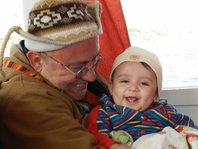 Having been a scientist involved in industry and research, I have learned that extraordinary science comes from extraordinary mentorship. As a future educator, I feel that my professional background, combined with a solid foundation in science education I will have the opportunity to instill in my students newfound enthusiasm for the sciences, helping them channel their strengths and identify and improve upon their weaknesses. Students of today are tomorrow's problem solvers and need to be provided with a quantitative skill set that gives them the confidence, independence and the creativity necessary to excel in the sciences.
Having been a scientist involved in industry and research, I have learned that extraordinary science comes from extraordinary mentorship. As a future educator, I feel that my professional background, combined with a solid foundation in science education I will have the opportunity to instill in my students newfound enthusiasm for the sciences, helping them channel their strengths and identify and improve upon their weaknesses. Students of today are tomorrow's problem solvers and need to be provided with a quantitative skill set that gives them the confidence, independence and the creativity necessary to excel in the sciences.
I will bring to Teachers College's Ph.D. Science Education program and the classroom over a decade of experience in industry and academia, real-world perspectives on science and specialized attention as to the connections between classroom science, industry and research work. As a graduate and post-doctoral student, I have educated technicians, undergraduates and other post-doctoral students in the theories behind our specific research, as well as teaching various lab techniques. In addition, I have had the opportunity to present and critically assess various scientific publications to a body of my peers though journal club seminars, educating them on how research was performed, and highlighting novel techniques employed. Adding to my teaching acumen, I have also presented my research and conveyed scientific information at national conferences, and student seminars.
Throughout my academic and professional career, I have come to find that there needs to be an additional classroom emphasis on the scientific method observation, forming a hypothesis, designing experiments to solve problems, and deriving conclusions or future directions based on results is critical to solving scientific problems. Students need to have the confidence to apply learned concepts and methodology to scientific problems, to see the applications of science, and develop problem-solving skills.
For the future, I am intent upon conducting education research that incorporates acknowledgement of neuroscientific findings. Neuroscientific research has proven that the human brain is capable of producing new neurons. Moreover, neurogenesis in the hippocampus helps regulate learning, memory and mood. This process can be positively influenced through everyday behaviors, which means, in terms of education, teachers/professors can actually encourage neuron development by providing thinking and skill building exercises, commonly known as brain-based learning. My aim would be to improve, not only awareness, but also the learning and processing of scientific knowledge in students in secondary through college-level education, particularly students with minor learning disabilities. There is also evidence to support the theory that such approaches to education may be beneficial to sufferers of chronic epilepsy, and depression.
In the nearer future, upon completing my Ph.D. in Science Education, I would like to learn more about science education by working as a practitioner in either secondary education or in a university setting. This exposure will aid me in my ultimate goal of opening a science and mathematics learning center, offering specialized programming catering to students with minor learning difficulties, such as dyslexia, ADD, ADHD, etc. The ideal would be to use this experience and educational center as a model for a charter high school, employing teachers with advanced degrees, and offering a curriculum that gives students exceptional, practical preparatory experiences that they can take with them to higher education.
These sorts of ambitions require close ties and positive relationships within a community. I have always been involved in volunteering, aiding my community, giving of my time and energy to nursing homes, soup kitchens, and while a graduate student, mentored students through a summer research project funded by the Department of Defense. Communities are only becoming increasingly diverse in terms of the rich tapestry of cultures and creeds they represent. As well as being bilingual, and living in Ireland for 10 months as an undergraduate, I have traveled throughout Europe and Caribbean and have spent 1-2 months at a time in Greece for the last quarter decade. These experiences have increased not only my worldview, but also my ability to interact effectively with people of a multitude of backgrounds. This is what I will bring to the classroom, as well: a healthy understanding and appreciation of ethnic differences, insights and skills to bridging cultural differences that may present themselves.
XXX University's Teachers College offers the finest education possible in my field, has almost 125 years of conceptual continuity, and is my sole choice for Science Education. I was particularly struck by not only the Teachers College's amazing faculty, but also the approach to learning, their maxim of producing alumni that will go on to serve society in an anthropological vein while never losing sight of the science that governs human development. I look forward to the opportunity to develop myself as a creative leader for science education research and practicum. Your time and consideration is greatly appreciated and I eagerly await a personal interview.

